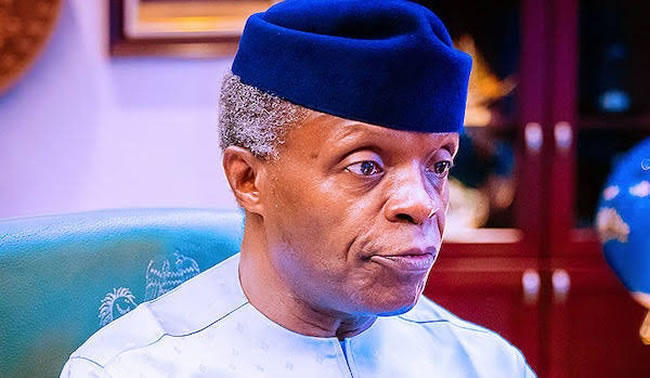
By Chijioke Okoronkwo
Vice President Yemi Osinbajo says the Social Investment Programmes (SIPs), digital economy and ease of doing business reforms, rank high among achievements of President Muhammadu Buhari administration over the past seven years.
The vice president spoke at on Monday in Abuja at the 3rd Ministerial Review Retreat organised to evaluate the progress made in the implementation of the agenda of the administration.
Osinbajo’s presentation was titled, `The President Muhammadu Administration, Reflections On The Journey So Far.’’
According to the vice president, experience has shown that it is possible to run large-scale programmes for the benefit of ordinary Nigerians in a fair and transparent manner.
“Using technology reduced the problems of human agency and discretion.
“Running such large programmes fairly goes a long way in encouraging ordinary Nigerians to believe and trust in the Government they voted into power.”
Osinbajo said another game-changing achievement of the government was the SIPs— an important ideological and policy statement for the ruling and the government.
“We took the view from the inception of the government that especially in a largely poor society must provide well-thought-out social safety nets, for the poorest and most vulnerable and interventions for the young unemployed.”
He said that the School Feeding Programme for public primary schools was feeding close to 10 million school children across the country.
Osinbajo added that the award-winning microcredit scheme for informal traders under the Government Enterprises and Empowerment Programme–TraderMoni, FarmerMoni MarketMoni–represented a major the achievement of the administration.
He listed other interventions for the young unemployed population.
“The N-Power programme, beginning with the employment of 500,000 and now with presidential approval engagement of 1 million, and creation of a National Social Register with 46 million persons in over 11 million poor and vulnerable households from across the federation.’’
On digital economy, Osinbajo said that the rapid expansion of broadband access and birthing of six Unicorns in the midst of two recessions underlined the impact of the administration’s efforts in the area.
He said that in Aug., 2019, the broadband coverage was 33.7 per cent but currently stood at 44.65 per cent representing close to 13 million new broadband users.
“ There were 13,823 4G base stations and we now have 36,751, representing a 165.86 per cent increase.
“The percentage of 4G coverage across the country also increased from 23 per cent to 77.52 per cent.
“Between 2015 and now, in the midst of two recessions, Nigeria now has six Unicorns.
“These are digital companies valued at over 1 billion dollar each, at least one of them is valued at 3 billion dollar, bigger than most Nigerian Banks.
“These include the companies Flutterwave, O-Pay, Andela, Interswitch, Jumia, Piggyvest and Paystack.”
He said that what would become the biggest contribution of the digital economy to Nigeria’s economic growth was the deployment of 5G technology.
“ We now have Presidential approval for the 5G policy.
“In terms of density, 4G allows connection to about 1 million devices in 500 square kilometres, while 5G will allow the same number of devices in just 1 square kilometre.
“ There are also very fast data rates of the 5G and more efficient energy usage.
“Also, the cost of data has crashed from N1,200 per GB in 2019 to about N360 today, making it easier for Nigerians to connect to the Internet.
“Now the Ministry of Communications and Digital Economy has embarked on the National Information and Communications Technology Infrastructure Backbone II, (NICTIB II) to connect 20 States with fibre optics that had not been connected in NICTIB I.”
The vice president said that another area the administration had recorded remarkable progress was with expanding the digital identity database.
He said that from less than 40 million people with National Identification Numbers (NINs) in 2020 while it had risen to 90,268,742 NIN records as at end of September.
“Digital identity is profoundly important for the entire economy.
“ It assures democratised access to basic services, like health, education and banking, and enables the inclusion of millions in the digital, economy.
“Another key strand of Nigeria’s digital journey is the stellar performance of our FinTech companies, the growth of which was supported by the Central Bank of Nigeria in terms of granting new categories of licences and providing clear regulatory guidelines for payment service providers.
“This has led to an explosion in participation with the value of digital transactions in Nigeria rising to N286 trillion in 2021.”
Osinbajo said that the Ease of Doing Business reforms was another remarkable achievement of the administration.
The vice president said that the reforms impacted Nigeria’s global rating.
“Between 2016 and 2019, Nigeria moved up 39 places in the World Bank Doing Business rankings and was twice named as one of the top 10 most improved economies in the world.”
“PEBEC, has since 2016 implemented 160 reforms; these include digitisation of company registration, tax payment, and the visa-on-arrival process.
“Legislative reforms with the active collaboration of the National Assembly which includes The Secured Transaction in Movable Asset Act 2017 and the Credit Reporting Act, 2017,’’ he said.
He also mentioned Justice Sector reforms particularly the establishment of small claims courts for the settlement of commercial disputes under N5 million as a major reform that enabled the growth of MSMEs.(NAN)



